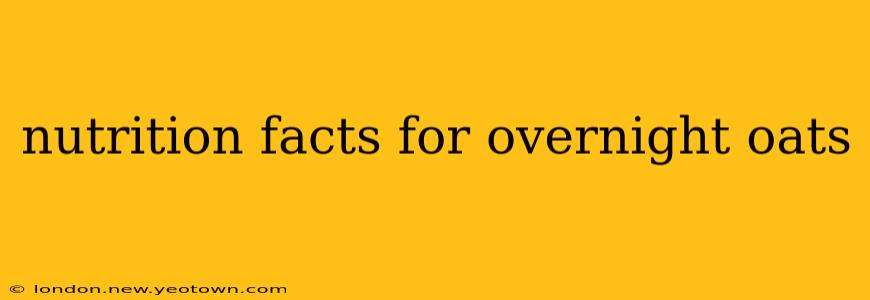Overnight oats have taken the breakfast world by storm, and for good reason! This simple, no-cook recipe is packed with nutrients, customizable to your taste, and incredibly convenient for busy mornings. But what exactly is the nutritional profile of this breakfast champion? Let's dive in!
The beauty of overnight oats lies in their versatility. The nutritional content varies drastically depending on the ingredients you choose. A basic recipe, however, typically centers around rolled oats, milk (dairy or non-dairy), and chia seeds. Let's examine the nutritional contribution of these core components before we explore variations.
What are the basic nutritional facts for overnight oats?
A typical serving of overnight oats (about ½ cup dry oats cooked with 1 cup milk) provides roughly:
- Calories: 300-400 (depending on milk choice and added ingredients)
- Fiber: 5-8 grams (crucial for digestion and satiety)
- Protein: 7-12 grams (again, depending on milk and additions like protein powder or nuts)
- Carbohydrates: 50-60 grams (mostly complex carbs for sustained energy)
These numbers are estimates. The actual nutritional value will fluctuate based on your specific recipe. Let's explore some common additions and their impact.
How do different types of milk affect the nutritional content?
The type of milk you choose significantly impacts the overall nutritional profile.
-
Dairy Milk (Cow's Milk): Provides calcium, vitamin D, and protein. Whole milk adds more fat and calories, while skim milk offers lower fat and calories.
-
Almond Milk: Lower in calories and fat than cow's milk, but often fortified with calcium and vitamin D. Check the label for added sugars.
-
Soy Milk: A good source of protein and often fortified with vitamins and minerals.
-
Oat Milk: Naturally high in fiber and often fortified with vitamins and minerals. A great option if you're avoiding nuts and dairy.
Choosing a milk alternative significantly changes the calorie, protein, and fat content of your overnight oats. Always check the nutrition label on your chosen milk.
What are the benefits of adding fruits and nuts to overnight oats?
Adding fruits and nuts dramatically boosts the nutritional value and flavor profile of your overnight oats.
-
Fruits (Berries, Bananas, Apples): Provide vitamins, minerals, antioxidants, and fiber. Berries, in particular, are packed with antioxidants.
-
Nuts (Almonds, Walnuts, Pecans): Excellent sources of healthy fats, protein, and fiber. They also add a delightful crunch.
-
Seeds (Chia Seeds, Flax Seeds): Rich in omega-3 fatty acids and fiber. Chia seeds are particularly helpful for thickening the oats and adding nutrients.
These additions transform your overnight oats from a simple breakfast into a nutrient-dense meal. Remember that adding extra ingredients will inevitably affect the total calories, fat, protein and carbohydrate counts.
Can you add protein powder to overnight oats?
Absolutely! Adding protein powder is a great way to boost the protein content of your overnight oats, making it a more filling and satisfying breakfast, particularly useful for those engaging in physical activity or aiming for muscle growth. Whey, casein, soy, and plant-based protein powders are all common additions. Remember to factor in the added calories and protein from the powder when calculating the overall nutritional value.
Are overnight oats good for weight loss?
Overnight oats can be part of a healthy weight-loss diet, primarily due to their high fiber content. Fiber promotes satiety, helping you feel fuller for longer and reducing overall calorie intake. However, the calorie count can vary widely depending on your additions, so mindful portion control and ingredient selection are key.
Are overnight oats suitable for people with diabetes?
While overnight oats are generally a healthy option, those with diabetes should monitor their carbohydrate intake carefully. The high carbohydrate content of oats, combined with the added sugars in some fruits or sweetened milk alternatives, can impact blood sugar levels. Opt for unsweetened milk alternatives and lower-sugar fruits to manage this better. Always consult your doctor or a registered dietitian for personalized dietary advice.
By understanding the base nutritional values and the impact of different ingredients, you can create a personalized overnight oats recipe that perfectly aligns with your dietary needs and preferences. Enjoy the delicious and nutritious benefits of this versatile breakfast!

